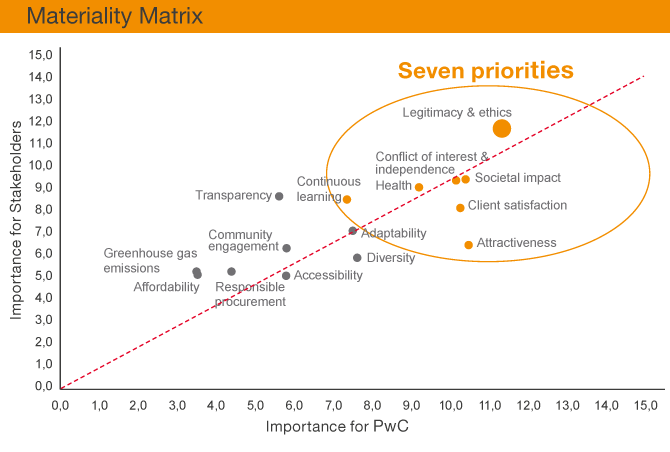
Introduction to sustainability

Our Sustainability Context
As our PwC Global Strategic leader wrote in his recently published book “Ten years before midnight”, we are in the middle of four crises (crisis of prosperity, crisis of technology, crisis of institutional legitimacy and crisis of leadership). Each crisis is urgent and must be responded to immediately with creativity, imagination and stubborn persistence. This agenda has clearly been placed on businesses in order to help them achieve their ambitions, and as challenges keep rising, stakeholders are increasingly looking to business to play a stronger role in creating long-term sustainable value.
The challenges COVID-19 presents are exacerbating the four crises we just mentioned. This pandemic is clearly a watershed event for humanity. We now ask ourselves what the best approach is to tackle the global health pandemic we are currently facing. Should we use the best practices we learned while addressing the four global challenges and apply them to COVID-19; or should we use our energy to solve our short term problems, with a long term view?

At PwC Luxembourg we use our material sustainability topics (see About Our Corporate Responsibility and Sustainability Journey) to help manage our financial activities, while also advancing our ESG performance. We also rely on sustainability trends to keep us on track throughout our sustainability journey and tackle the global challenges we are facing. In our perception, this is how we can create value while also delivering on our purpose, “To build trust in society and solve important problems”.
Within this spirit, this year, we have committed to going two steps further. Firstly, we have aligned our material sustainability topics with the global agenda, namely the Sustainable Development Goals (SDGs) and, secondly, with the latest initiative of the World Economic Forum (WEF) and the International Business Council (IBC), Towards Common Metrics and Consistent Reporting of Sustainable Value Creation.
This material makes reference to GRI disclosure 102-46b

Aligning with the Global Agenda
At PwC Luxembourg, we use the SDGs to drive our Corporate Responsibility agenda. Through an internal SDG self-assessment that we are conducting, we are able to understand our risks and opportunities in the context of global change and how we can use the goals to set our sustainability priorities and business goals.
In light of the global health pandemic we are currently in, it can be argued that the SDGs can also act and be used as a potential framework to the coronavirus. During these times, it is important to remember that society is best served by corporations that have aligned their goals to the long-term goals of society and to international agendas such as the 2030 Agenda for Sustainable Development.
“Now more than ever, as big decisions are made about our future, companies need to address environmental, social and governance risks holistically and move beyond business-as-usual.”
Towards Common Metrics and Consistent Reporting of Sustainable Value Creation
It is a challenge for all businesses to demonstrate long term value creation for all stakeholders. For four years now, we have worked and reported on what we believe are key drivers of sustainable value creation for our clients, people and society (“our material topics”) .
Even though the proposal of “Towards Common Metrics and Consistent Reporting of Sustainable Value Creation” was only recently released, we took it upon ourselves to use it as a framework to guide our Corporate Responsibility agenda. In that spirit, we have aligned our seven historic material topics and our four Corporate Responsibility Pillars (see below) to the four main pillars (Principles of Governance, People, Prosperity and Planet) proposed by the WEF/IBC. We have also aligned our material topics on the 21 core metrics, and where relevant have also reported on the extended metrics.
In a nutshell, the WEF/IBC project “Towards Common Metrics and Consistent Value Creation” helped us align and expand our reporting on topics that are in our view, key to our future performance.
About our Corporate Responsibility and Sustainability Journey
The global challenges we face today cause distrust between society and businesses. This was only accelerated by COVID-19. Consequently, more pressure is being placed on corporate enterprises to realign the business ecosystem with society. We at PwC Luxembourg are convinced that we have a role to play and remain relevant for all our stakeholders in ensuring a sustainable future for the global economy and for the ecosystem we are operating in. To achieve this goal, we decided in 2016 to start a corporate responsibility and sustainability agenda.
We kick-started our journey by hosting various stakeholder engagements. In order to ensure an effective stakeholder engagement, we first sat down with some of our PwC Partners to identify and select relevant stakeholders. Four groups were identified (employees which including alumni and trainees, clients, suppliers, and a group of strategic stakeholders which included the media, regulators, the government, academics and NGOs), with whom we had in-person workshops to prioritise 15 sustainability topics that were previously identified as most material by 134 PwC Partners. Stakeholder engagements are important for guiding governance to prioritise long-term value, strengthening accountability and building trust between the organisation and its stakeholders.
Amongst the 15 sustainability topics, seven were identified as a top priority:
1. Societal Impact
2. Client Satisfaction
3. Independence & Conflict of Interest
4. Legitimacy & Ethics
5. Employee Journey
6. Health
- 7. Continuous Learning

These are our strategic topics that PwC Luxembourg’s CR & Sustainability leader, Valérie Arnold, together with our CEO and leadership team, aim to align with our business strategy. They identify where and how we can make a difference to our stakeholders, and how we measure success as a result, both financially and non-financially. While all our topics are interlinked and mutually reinforcing, “Societal Impact” acts as an overarching topic, as it sets out our mission to embed sustainability into everything we do.
This material makes reference to GRI disclosures 102-19 ; 102-20 ; 102-21 ; 102-40 ; 102-42 ; 102-43 ; 102-44 ; 102-46a ; 102-46b ; 102-47
This material makes reference to WEF core disclosure - Principles of Prosperity - Stakeholder Engagement - Material issues impacting stakeholders
Societal Impact
We are aware that in order to maximise our societal impact, we need to, through the services we provide, use our ability and potential to make the best of our knowledge and expertise. This will allow us to serve our purpose, to build trust and solve important problems. Our approach can be viewed from three perspectives:
FIRM. By aligning our sustainability strategy with the SDGs and the common sets of metrics recommended by the WEF-IBC (link ‘Our sustainability context’), we aim to belong to a growing group of companies who are taking action in the post-COVID recovery: a clear long-term sustainability vision, strategy and action plan, for ourselves and for our clients. This will empower us to be transparent beyond financial performance, a pressure we are receiving from both national and international stakeholders.
PEOPLE. As our People are our main capital ( ‘Employee Journey’; ‘Health’; and ‘Continuous learning’), they need to have the relevant skills to be up-to-date with the latest trends, while also knowing how to tackle them. This will support our clients in anticipating global challenges, how to deal with them and even how to turn them into opportunities. Therefore, we used the best of our knowledge and expertise to contribute to solve societal challenges through the services we provide.
MARKET. Due to the global challenges we are facing, we need to adjust our sustainability-related services so that they take into consideration our clients future needs and expectations. It is equally as important that we stay up-to-date with the latest sustainability trends (such as the Common Metrics proposed by the World Economic Forum and the International Business Council) in order to help our clients align with global agendas.
This material makes reference to GRI disclosures 102-44 ; 102-46a ; 102-46b ; 102-47 ; 103-1 ; 103-2 ; 103-3 ; 203-1









